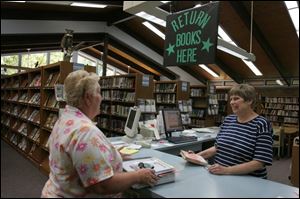
Libraries feel pinch of fewer dollars from state
9/29/2005
Jane Kohlenberg, right, director of the Pemberville Public Library, discusses library services with Diane Henry.
Since 2001, the board of Van Wert's Brumback Library has struggled with a problem: Should it keep cutting services to match dwindling state funds, or ask voters to pass its first levy since the Great Depression?
"It's a very difficult decision to come to," Brumback director John Carr said. "The board of trustees and myself, we have tried everything in the last four years. You're looking at four good years of debate."
The debate ended in a decision to put a half-mill tax on the Nov. 8 ballot. It was a move library experts expect to become more common as Ohio's libraries feel the pinch of reduced state funding.
Elsewhere in northwest Ohio, the Milan-Berlin Township Public Library is seeking a 1-mill levy, also citing reduced state funding in its appeal to voters. "Because of the shrinking state budget, we have been making specific cuts" in hours, staff, and equipment, library board president Colleen Murray said.
In Pemberville, where the library has a 1-mill levy on the ballot, however, state funding has less to do with the situation than crowding and increased use. But even there, it plays a role. In the last several years, the library has been unable to save much money to put toward its expansion projects, a course it followed in the past.
The cuts have "caused us not to have the kind of balance at the end of the year to give us the kind of cushion as we were able to have in the '90s," said Jane Kohlenberg, director of the Pemberville Public Library.
Ohio's library funding system depends on its Library and Local Government Support Fund, which gets its money from a 5.7 percent allocation of the state's personal income tax.
The money is redistributed throughout the state, bringing relief to poor counties by sharing the wealth from the richer ones.
The system "does try to correct for the real imbalances that existed prior to 1984," when the support fund was formed, said Lynda Murray, director of government and legal services for the Ohio Library Council in Columbus.
"It slowly but surely brings those smaller systems up to speed. It's brought equity to all size libraries."
In fact, librarians across America envy Ohio's system.
"That is something in which Ohio is leading the nation," said Michael Gorman, president of the American Library Association in Chicago.
Given its model system, why are some Ohio libraries in financial straits now?
The support fund rate has been frozen for a few years now, meaning less money for libraries. And Mr. Gorman and Ms. Murray cited the flat economy as a big factor.
In Lucas County, the library system asked voters to come up with additional dollars to offset less money from the state. In 2003, Lucas County voters approved a new 1-mill operating levy to raise $7.8 million a year.
The levy helped the library sustain the level of service residents had come to expect, director Clyde Scoles said.
But in response to the continual freeze of funds, the seven members of the Toledo-Lucas County Public Library board agreed Sept. 22 to reduce the system's $35 million budget by $665,705, which will mostly affect the acquisition of materials such as books and videos.
The Wood County District Public Library in Bowling Green has not cut hours or programming, but director Elaine Paulette said the library has not been at full staff for some time. When an employee leaves, the library re-examines the position and reallocates duties when possible.
"We built our 2005 budget around the 2004 revenues, so we anticipated there would not be any increase, and that's where we are," she said.
"As the federal budget mess leaks down to the states, and they're given unfunded mandates to fund, then that leaks down to the local levels," Mr. Gorman said.
"I think five years of ever-rising [federal] debt is having an effect at the local levels. Something has to give."
Ms. Murray expects to see more local libraries go to the voters for money.
The crop of levy requests, including those in northwest Ohio, will only grow, she said.
"I think we're going to see a big swing next year," she said. "I think libraries have become more and more concerned that the LLGSF, which used to be stable ... has been subject to the vagaries of the state budget process.
"More and more libraries are going to look at other revenue streams," Ms. Murray said.
That's subject to approval, of course.
"It's in the voters' hands,"
Contact Vanessa Winans at:
vwinans@theblade.com
or 419-724-6168.